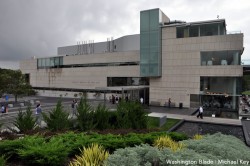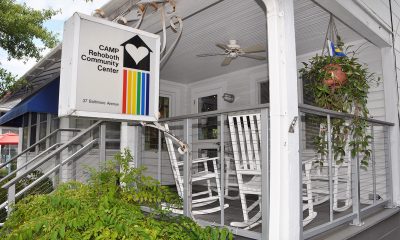Living
You don’t have to go far to get away
Richmond, Philly, Rehoboth, Lost River make for memorable regional getaways

Richmond rolls out the rainbow carpet
The Richmond Convention & Visitors Bureau — like those of many mid-size cities — has put a lot of effort into enticing the lavender dollar. Virginia may be one of the most anti-gay states legislatively, but Richmond is rolling out the rainbow carpet and has much to offer the discerning gay traveler.
For starters, it’s only two hours from Washington. And taking a comfortable round-trip Amtrak ride from Union Station runs about $50.
LGBT travelers are especially welcome at the Linden Row Inn as well as Maury Place at Monument bed and breakfast.
The Linden Row Inn offers spacious rooms filled with ornate antiques from the mid-to-late 1800s. The fully restored Greek revival hotel is conveniently located in the center of historic downtown Richmond. Prices range from around $110 per night for a sprawling, well-decorated two-bedroom to around $240 per night for a gracious parlor room. For more information or to reserve a room, go to lindenrowinn.com.
The gay-owned Maury Place at Monument bed and breakfast offers an intimate setting with meticulous attention to design. The luxury guesthouse boasts a seasonal swimming pool, four suites with sumptuous decor, heated tile floors in the bathrooms and a welcoming-yet-unobtrusive staff. Prices range from around $190 to $290 per night. Go to mauryplace.com to book a room.
There are many great restaurants in Richmond, but Chez Fouchee and the Empress stand out.
Chez Fouchee, a gay-owned restaurant nestled between downtown and the Broad Street arts district, has an affordable-yet-satisfying lunch menu seven days a week and a fine dining dinner on Fridays and Saturdays. For lunch, try an artisan baguette sandwich, the quiche du jour or one of the original salads. Prices range from $7.50 for a baguette or salad to $13.50 for a lunch steak. For the more formal dinner, be prepared to spend more than $20 per entrée. Save room for dessert; the rich lemon butter cake is worth the extra trip to the gym. For menus, reservations and more information, go to chezfoushee.com.
The Empress serves elegant cuisine that any foodie will love. The cozy lesbian-owned restaurant offers scintillating and innovative dishes ranging from bison lasagna to pistachio crusted duck breast. Vegetarian options round out the menu. Prices for entrées range from $10 to $15 and market price for seafood. The Empress serves breakfast and lunch Mondays through Fridays and dinner Tuesdays through Sundays with a brunch on Sundays. Go to theempressrva.com for more information.
There are many things to do in Richmond, and plenty to perk the interest of the LGBT traveler looking for art, history and nightlife.
The Virginia Museum of Fine Arts is a major attraction for travelers and Richmond residents alike. The glass and stone museum holds 23,000 works of art in its permanent collection and is host to world-class special exhibitions. Go to vmfa.museum for information on exhibits, food, events and more.
The River City is home to several theater companies with shows ranging from the classics to the avant garde. Of special interest to a gay audience is Richmond Triangle Players, an LGBT theater company. James Edwin Parker’s gay-themed “2 Boys in a Bed on a Cold Winter’s Night” is having its Virginia premiere on Thursday and will run through Feb. 4. Go to rtriangle.org for tickets, show times and more information on the company.
To unwind after a long day of exploring, there are many LGBT nightlife destinations. For an action-packed nightlife experience, go to Nations on West Broad Street. The club has two bars, a large dance floor and a drag cabaret. For a more laid back experience, Barcode on East Grace Street offers a friendly atmosphere complete with lunch and dinner specials. The best place to meet women is Babes of Carytown located on West Cary Street. Babes is welcoming to everyone and features live music and a drag show. Godfrey’s Restaurant and Nightclub on East Grace Street transforms from a lively dance club at night to a fun drag brunch on Sunday mornings. Reservations are required for the drag brunch.
There’s an LGBT section at visitrichmondva.com that’s a must-visit site if you plan to go.
MICHAEL KEY
Flowers, photos and more in Philly
As one of the country’s largest metro areas, Philadelphia is always bustling with gay energy but two spring attractions are especially worth noting — lesbian photographer Zoe Strauss has a major exhibit at the Philadelphia Museum of Art that runs through April 22. And time your visit right and you can also catch the Philadelphia International Flower Show slated for March 4-11.

One of the major exhibits at last year’s Philadelphia Flower Show (Photo courtesy Pennsylvania Horticultural Society)
The latter, a tradition since 1829 that now draws about 250,000 visitors each year, is “a fantastic show for anybody interested in flowers, plants and greening but anybody can enjoy it,” says Alan Jaffe, PR manager for the Pennsylvania Horticultural Society, which stages the event each year.
This year’s theme is “Hawaii: Islands of Aloha” so expect the usual eye-popping displays built around an exotic theme. LGBT Night Out is March 5 from 6 to 8:30 p.m. and the event always draws plenty of gays including exhibitors, designers, landscape architects and more.
The event is at the Pennsylvania Convention Center (12th and Arch Streets). Visit theflowershow.com for details.
Strauss is an unlikely success story. The former babysitter with no formal training in photography launched a 10-year project to display her work for one day each year underneath Interstate 95 in South Philadelphia (she’s a Philly native). Critical acclaim came in time and now she’s the subject of a major exhibition that launched two weeks ago and features several special events as well as 39 donated billboard displays featuring her photos through the spring.
The 41-year-old Strauss, who lives with her wife Lynn Bloom in South Philly, says her lesbian identity is endlessly informing of her work even in non-obvious ways.
“It’s extremely central to it because I’m a lesbian and my work is very personal so it’s central to everything I make whether it’s presented in that moment or not,” she says. “I’m very interested in gender and the fluidity of it, so it’s of great importance to my overall body of work,” she says. “And even if (a particular image) is not directly related to the LGBT community, it still kind of always is because I’m the one making it.”
The Museum is on the Benjamin Franklin Parkway at 26th Street. Visit philamuseum.org for details.
JOEY DiGUGLIELMO
Rehoboth’s off-season appeal
Before the summer rush, there are loads of activities that Washington’s LGBT community will find enticing in Rehoboth Beach, Del.
You can see men in skimpy swim trunks or elaborate costumes plunge into the cold Atlantic Ocean on Feb. 5 in a benefit for Special Olympics Delaware, and a week later, on Feb. 11, you can shop at the Convention Center at the state’s largest indoor garage sale, Merchant’s Attic I. Merchant’s Attic II is scheduled for St. Patrick’s Day.
The Blue Moon reopens Feb. 9, and judging by the dumpsters outside the Moon this winter, there are many upgrades awaiting inside.
Washington’s own Gay Men’s Chorus will join with the CAMP Rehoboth Chorus in concert on Feb. 11 at 7 p.m.
The President’s Day weekend traditionally has CAMP Rehoboth co-sponsor a mini film festival called “Another Take” with the Rehoboth Beach Film Society. This year, the films are the award-winning “Beginners” (Feb. 18), and the Chely Wright documentary, “Wish Me Away” (Feb. 19). Both begin at 2 p.m. and are shown upstairs at the Movies at Midway.
March 3 brings another Rehoboth tradition, as the Convention Center will be filled with the smell of chocolate at the annual Chocolate Festival. March will end with another Convention Center tradition, now in its 15th year, the Resorts Home Expo, showcasing the top home service companies, developers, Realtors and mortgage firms (March 31-April 1).
Camp Rehoboth holds a Women’s Fest each April, this year from April 12-15, and will feature Col. Grethe Cammermeyer and Suzanne Westenhoefer among others.
If you have a summer residence at the beach or are thinking of owning a place, you’ll want to want to check out the Designer Show House (10 Fourth Street) on Fridays through Sundays April 20-May 6. For the odds and ends that you must have, the very popular annual Spring Sidewalk Sale will be held May 18-20. And do not forget that the second Saturday of each month throughout the year the arts community holds the Mosaic Art Walk.
If you are looking for pure entertainment, most of the bars and restaurants continue to offer specials during the winter and spring and there are theater options at both Clear Space in Rehoboth and Possum Point in Georgetown, or you might want to check out the expanded Proud! Bookstore, which has moved directly across from its former location at Village by the Sea, on the Baltimore Avenue side.
PETER SCHOTT
Big change in Lost River
If you’re more into mountains than beaches, then consider visiting Lost River, W.Va. Curl up with a good book by the fire, enjoy a robust cabernet with friends at the Guesthouse, or go for a brisk winter hike.
After 30 years in business, the gay-owned Guesthouse at Lost River changed ownership earlier this month. New owners Michael Cooley and Gary Robinson promise to continue the gay-friendly traditions of the Guesthouse. They are currently featuring a winter craft beer selection from Frederick’s Flying Dog Brewery in the lounge. The Guesthouse also offers wedding packages and can supply couples with photographers, DJs and everything to make the celebration of your wedding or commitment ceremony memorable. Visit guesthouselostriver.com for more information.

Valentine’s Day is often portrayed as a celebration of romantic love — flowers, chocolates, and candlelit dinners. But for many LGBTQ+ individuals and couples, Valentine’s Day can also be a moment to reflect on something deeper: the love that creates a safe, welcoming home.
For LGBTQ+ home buyers and sellers, homeownership is more than a financial milestone—it is an act of belonging, resilience, and pride. Owning a home can mean finally having a place where you can hold hands with your partner on the front porch, decorate with your authentic style, and build a life free from judgment. In this way, buying or selling a home is one of the most meaningful love stories many LGBTQ+ people will ever write.
This Valentine’s Day, whether you’re a first-time gay home buyer, a same-sex couple upgrading your space, or an LGBTQ+ seller moving on to your next chapter, it’s worth thinking about how love, identity, and real estate intersect—and how to navigate that journey with confidence, protection, and the right support.
Love, Identity, and the Meaning of ‘Home’
For generations, LGBTQ+ people were denied equal access to housing, homeownership, and legal protections. Even today, many LGBTQ+ home buyers still face subtle bias, uncomfortable interactions, or outright discrimination in the real estate process.
That’s why finding LGBTQ+ friendly real estate and an affirming gay friendly realtor or lesbian realtor matters so much. A home isn’t just a building—it’s a personal sanctuary. Working with LGBTQ+ real estate agents who understand your lived experience can make all the difference between a stressful transaction and a joyful one.
For over 30 years, GayRealEstate.com has been the leading gay real estate network, connecting LGBTQ+ home buyers and sellers with gay real estate agents, lesbian real estate agents, and LGBTQ+ friendly realtors who truly “get it.” Their mission has always been simple yet powerful: to ensure that every LGBTQ+ person has access to safe, respectful, and inclusive real estate services.
Finding Your Match: Choosing the Right LGBTQ+ Friendly Realtor
Much like dating, finding the right real estate agent is about compatibility, trust, and communication. Here are some key tips for choosing the best LGBTQ+ real estate representation:
- Look for experience with LGBTQ+ clients. Search for a gay realtor near me or lesbian realtor near me through GayRealEstate.com, where agents are vetted for cultural competency and community commitment.
- Ask about their experience with same-sex couple home buying. A strong agent should understand issues like joint ownership, legal protections, and financing considerations.
- Choose someone who listens. You should feel safe sharing your priorities—whether that includes proximity to LGBTQ+ nightlife, affirming schools, or lesbian-friendly neighborhoods.
- Prioritize respect and transparency. Your agent should advocate for you, not just push a quick sale.
The right gay friendly real estate agent isn’t just helping you buy a house—they’re helping you find a place to build your life.
Best Cities for LGBTQ+ Home Buyers
If love is your compass, location is your map. Some of the best cities for LGBTQ+ home buyers consistently offer strong community presence, legal protections, and welcoming neighborhoods:
- Wilton Manors, Florida – A hub for LGBTQ+ culture with thriving LGBTQ+ real estate opportunities
- Palm Springs, California – A long-standing LGBTQ+ retirement and second-home destination
- Provincetown, Massachusetts – Historic LGBTQ+ community with progressive housing protections
- Asheville, North Carolina – Growing market with inclusive real estate services
- Fort Lauderdale, Florida – Diverse, welcoming, and highly sought-after for LGBTQ+ home ownership
Working with GayRealEstate.com allows you to connect with local LGBTQ+ real estate experts who know these markets inside and out.
Navigating Legal Protections in LGBTQ+ Real Estate
Love is universal—but legal protections are not always consistent. Understanding your rights is essential when buying or selling a home as an LGBTQ+ person.
Key protections include:
- Fair Housing Act (FHA): Prohibits discrimination based on sex, which courts have increasingly interpreted to include sexual orientation and gender identity.
- State and local protections: Many cities and states offer additional safeguards against LGBTQ+ housing discrimination.
- Same-sex couple legal considerations: If you are married, joint ownership is typically straightforward. If not, consult an attorney about co-ownership agreements.
A knowledgeable LGBTQ+ friendly realtor from GayRealEstate.com can help guide you through these complexities and connect you with trusted legal professionals when needed.
Buying a Home as an LGBTQ+ Person: Practical Tips
If you’re embarking on your home-buying journey this Valentine’s season, here are smart, practical steps to take:
- Clarify your priorities. Do you want a vibrant LGBTQ+ neighborhood, quiet suburbs, or access to queer community spaces?
- Get pre-approved for a mortgage. This strengthens your position in competitive markets.
- Work with an LGBTQ+ real estate agent. Searching “finding a gay real estate agent” or “finding a lesbian real estate agent” through GayRealEstate.com is a great first step.
- Research inclusive communities. Some neighborhoods are more welcoming than others.
- Know your rights. If you experience bias, document it and seek legal guidance.
Buying a home is an act of self-love—and community love.
Selling a Home as an LGBTQ+ Person
Selling can be just as emotional as buying, especially if your home represents years of memories with your partner, friends, or chosen family.
When selling a home as an LGBTQ+ person, consider:
- Working with a gay friendly realtor who will market your home inclusively
- Highlighting LGBTQ+ community appeal in listings
- Being prepared for potential buyer bias (and knowing how to respond)
- Leaning on GayRealEstate.com’s LGBTQ+ real estate services for trusted guidance
Your story—and your home—deserve respect.
Real Estate for LGBTQ+ Families
More LGBTQ+ couples are raising children, fostering, or building blended families. This makes homeownership even more meaningful.
When searching for real estate for LGBTQ+ families, consider:
- LGBTQ+ affirming school districts
- Family-friendly queer communities
- Safe neighborhoods with inclusive values
- Access to LGBTQ+ resources and social networks
GayRealEstate.com specializes in helping LGBTQ+ families find homes that truly fit their lives.
Love, Pride, and Homeownership
At its core, Valentine’s Day is about connection. For LGBTQ+ people, homeownership can be one of the most profound expressions of love—love for yourself, your partner, your family, and your future.
Whether you are a first-time gay home buyer, a same-sex couple relocating, or an LGBTQ+ seller moving forward, you deserve an experience rooted in dignity, fairness, and celebration.
For over three decades, GayRealEstate.com has stood as the leading source for LGBTQ+ real estate, gay real estate, lesbian real estate, and LGBTQ+ home buying and selling representation. Their nationwide network of gay real estate agents, lesbian-friendly real estate agents, and LGBTQ+ friendly realtors ensures that your real estate journey is guided by professionals who understand your heart—and your home.
This Valentine’s Day, let your next chapter be written in a place where you can truly belong. Because when love leads the way, home is never far behind.
Scott Helms is president and owner of Gayrealestate.com.

Dear Michael,
I keep getting rejected on the apps. I don’t want to put myself out there anymore.
I don’t understand gay men. I think they behave really badly.
Guys stop replying in the middle of a text conversation and then un-match me. Guys don’t show up when we make a plan to meet. After a date or even a hookup that it seems clear we both enjoyed, I never hear from the guy again.
I am a pretty good looking and successful guy. I’m not a model or a billionaire but I’m sincerely wanting to date and eventually share a life with someone.
Unfortunately, everyone I am meeting, even if they say they have similar aspirations for a partner, acts like they’re looking over my shoulder for something better, and drops me for I-don’t-know-what reason.
I don’t have a lot of trust in the sincerity of gay men.
I know I sound bitter but I’ve been at this for a while and it keeps happening.
I know there’s a saying that if it keeps happening to you, you must be the problem. Logically that makes sense.
Except, I think this keeps happening so often and so predictably that it’s not me. These people hardly know me. It’s more along the lines of, if everything about me isn’t exactly what they want, or some little thing that I say, think, or do offends them, they vanish.
I’m lonely, but what’s out there is awful. Maybe it’s best to not keep trying.
If you have a different way of seeing it that’s honest, not just some fluff to make me feel better and be hopeful, please enlighten me.
Michael replies:
I agree with you, there is a lot of this kind of behavior out there. I hear stories similar to yours all the time. Though people do find great relationships online, relying on apps to meet a partner can be tricky.
Hookup apps have little to do with any kind of real connection. Often, they don’t even have much to do with sex. For a lot of people, they’re more about trying to fill up some kind of emptiness and seeking validation. They also, obviously, objectify men, which is the opposite experience of what you’re seeking.
And dating apps lend themselves to a sort of takeout menu concept of dating. You get to specify exactly what you’re looking for—a little of this, a lot of that, please omit something else—and then believe you should get what you ordered. As if that really exists. And when something isn’t just what you wanted, forget it.
But life doesn’t work that way. Nor do people: You can enter the exact criteria for the man of your dreams, but he will surprise you or let you down at times in some major ways. That’s how it goes. Part of being in a relationship is accepting that we all have to deal with imperfection.
All that said, hordes of people are going to keep using all sorts of apps and keep looking for “perfect” partners and keep ditching perfectly fine guys for the most minuscule of reasons.
But that doesn’t mean that you have to stay on the apps if it’s demoralizing you and leaving you hopeless.
Before you sign off, perhaps you would like to have some fun and be creative. Just for example, you could write in your profile that you’re interested in meeting a guy who isn’t looking for perfection and is looking for a decent soul rather than a set of stats. You still might encounter a lot of guys who ghost you for no apparent reason, but you also might have some luck finding a sincere someone with relationship goals that are similar to yours.
Another, complimentary strategy: Toughen up your attitude to stop letting let these rejections get under your skin. They have little to do with who you are (unless you are oblivious to some major issue about yourself), so you needn’t take them personally. In other words, expect this to keep happening; and when it does, laugh and keep moving forward.
I understand you are feeling like giving up on gay men in general. Keep in mind that while there are a lot of reasons why many gay men focus more on sex and less on commitment, that isn’t true across the board. In my work over the years, I have met many gay men who are looking for what you’re seeking. You could strive to be hopeful that if you keep looking, you are likely to cross paths with some of them.
And where you look may play a role.
Whether or not you stay on the apps, I suggest you seek additional ways to meet a potential boyfriend. Before apps existed, people did find other ways to meet romantic partners, and these ways do still exist. I know that this path is not an easy one. The whole dating endeavor isn’t easy. But difficult is not impossible.
There are social and activity groups for gay men that are organized around some sort of shared interest. They aren’t overtly sexual, so often attract people who are interested in and looking for a deeper connection. Even if you don’t meet a boyfriend there, you might make some like-minded friends, and one thing may lead to another in all sorts of ways.
There’s also plenty you can do as a human being (not simply as a gay man) in the offline world that might interest and even uplift you, where you just might meet a man you like. Again, you might also simply make some friends, and through having a bigger social life, might ultimately meet your guy.
Simply put: Don’t let yourself feel like or be a victim. Don’t keep putting yourself in miserable situations. And figure out what it means for you to do your best to make what you’d like to happen, happen.
Michael Radkowsky, Psy.D. is a licensed psychologist who works with couples and individuals in D.C., Maryland, Virginia, and New York. He can be found at michaelradkowsky.com. All identifying information has been changed for reasons of confidentiality. Have a question? Send it to [email protected].
Real Estate
New year, new housing landscape for D.C. landlords
Several developments expected to influence how rental housing operates

As 2026 begins, Washington, D.C.’s rental housing landscape continues to evolve in ways that matter to small landlords, tenants, and the communities they serve. At the center of many of these conversations is the Small Multifamily & Rental Owners Association (SMOA), a D.C.–based organization that advocates for small property owners and the preservation of the city’s naturally occurring affordable housing.
At their December “DC Housing Policy Summit,” city officials, housing researchers, lenders, attorneys, and housing providers gathered to discuss the policies and proposals shaping the future of rental housing in the District. The topics ranged from recent legislative changes to emerging ballot initiatives and understanding how today’s policy decisions will affect housing stability tomorrow.
Why Housing Policy Matters in 2026
If you are a landlord or a tenant, several developments now underway in D.C., are expected to influence how rental housing operates in the years ahead.
One of the most significant developments is the Rebalancing Expectations for Neighbors, Tenants and Landlords (RENTAL) Act of 2025, a sweeping piece of legislation passed last fall and effective December 31, 2025, which updates a range of housing laws. This broad housing reform law will modernize housing regulations and address long-standing court backlogs, and in a practical manner, assist landlords with shortened notice and filing requirements for lawsuits. The Act introduces changes to eviction procedures, adjusts pre-filing notice timelines, and modifies certain tenant protections under previous legislation, the Tenant Opportunity to Purchase Act.
At the same time, the District has expanded its Rent Registry, to have a better overview of licensed rental units in the city with updated technology that tracks rental units subject to and exempt from rent control and other related housing information. Designed to improve transparency and enforcement, Rent Registry makes it easier for all parties to verify rent control status and compliance.
Looking ahead to the 2026 election cycle, a proposed ballot initiative for a two-year rent freeze is generating significant conversation. If it qualifies for the ballot and is approved by voters, the measure would pause rent increases across the District for two years. While still in the proposal phase, it reflects the broader focus on tenant affordability that continues to shape housing policy debates.
What This Means for Rental Owners
Taken together, these changes underscore how closely policy and day-to-day operations are connected for small landlords. Staying informed about notice requirements, registration obligations, and evolving regulations isn’t just a legal necessity. It’s a key part of maintaining stable, compliant rental properties.
With discussions underway about rent stabilization, voucher policies, and potential rent freezes, long-term revenue projections will be influenced by regulatory shifts just as much as market conditions alone. Financial and strategic planning becomes even more important to protect your interests.
Preparing for the Changes
As the owner of a property management company here in the District, I’ve spent much of the past year thinking about how these changes translate from legislation into real-world operations.
The first priority has been updating our eviction and compliance workflows to align with the RENTAL Act of 2025. That means revising how delinquent rent cases are handled, adjusting notice procedures, and helping owners understand how revised timelines and court processes may affect the cost, timing, and strategy behind enforcement decisions.
Just as important, we’re shifting toward earlier, more proactive communication around compliance and regulatory risk. Rather than reacting after policies take effect, we’re working to flag potential exposure in advance, so owners can make informed decisions before small issues become costly problems.
A Bigger Picture for 2026
Housing policy in Washington, D.C., has always reflected the city’s values from protecting tenants to preserving affordability in rapidly changing neighborhoods. As those policies continue to evolve, the challenge will be finding the right balance between stability for renters and sustainability for the small property owners who provide much of the city’s housing.
The conversations happening now at policy summits, in Council chambers, and across neighborhood communities will shape how rental housing is regulated. For landlords, tenants, and legislators alike, 2026 represents an opportunity to engage thoughtfully, to ask hard questions, and to create a future where compliance, fairness, and long-term stability go hand-in-hand.
-

 Theater5 days ago
Theater5 days agoMagic is happening for Round House’s out stage manager
-

 Baltimore3 days ago
Baltimore3 days ago‘Heated Rivalry’ fandom exposes LGBTQ divide in Baltimore
-

 Real Estate3 days ago
Real Estate3 days agoHome is where the heart is
-

 District of Columbia3 days ago
District of Columbia3 days agoDeon Jones speaks about D.C. Department of Corrections bias lawsuit settlement























